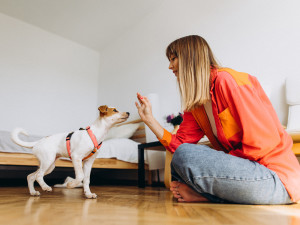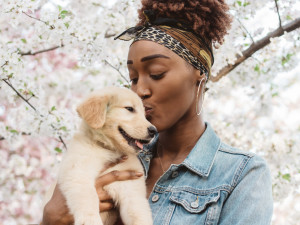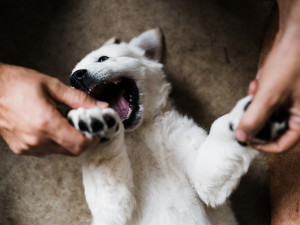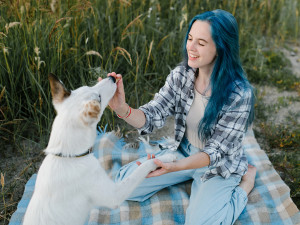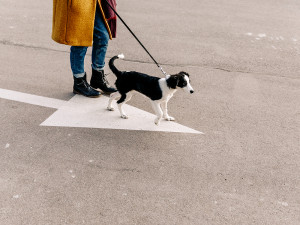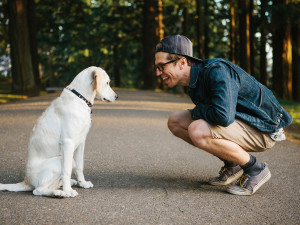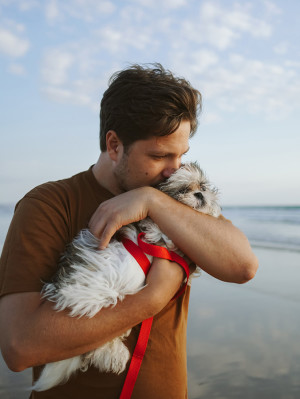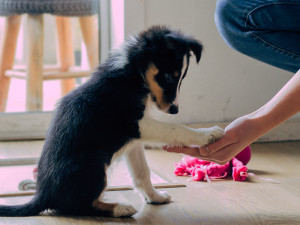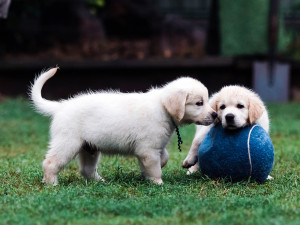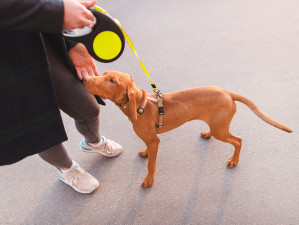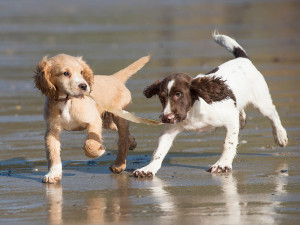How to Calm a Puppy Down
Yes, it is possible.
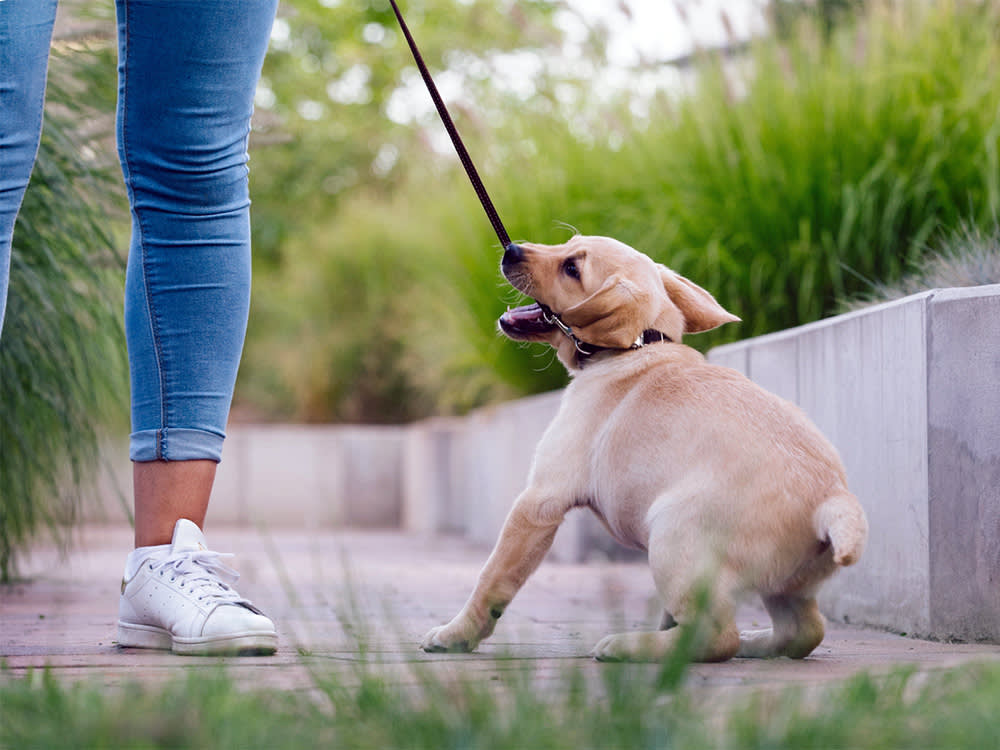
share article
In This Article:
Why Do Puppies Become Overexcitedopens in a new tab Triggers for Overexcitement opens in a new tab How to Tell If Your Puppy Is Overexcited opens in a new tab How to Calm a Puppy Downopens in a new tab At What Age Do Puppies Calm Downopens in a new tab
One minute your puppy is snoozing on the floor, and the next they’re running from room to room as fast as they can. These sudden switches in behavior can give new pup parents whiplash — and make it next to impossible to get anything done when you’re constantly worried about what your pet is getting up to.
Puppies will be puppies, but if you’re feeling exhausted with all the running around, you can learn how to calm down a puppy when they get the zoomies opens in a new tab(and hopefully get some relaxation time yourself).
Why do puppies become overexcited?
Remember that your puppy is new to the world, so everything is fascinating. Of course, they want to explore! But if your puppy experiences too many new things in one day, they may become overstimulated, overwhelmedopens in a new tab, or even overexcited.
In most cases, however, hyperactivity and overexcitement opens in a new tab are a result of not enough mental stimulation, instead of too much. If your puppy feels bored, they may look for ways to keep entertained, which can be destructive, like chewing on furniture or other things they shouldn’t. Mental stimulation is essential for your puppy’s growth and developmentopens in a new tab into a healthy adult dog. And while it may be exhausting when your puppy gets the zoomies, eventually they will settle down as they become more accustomed to and comfortable with their surroundingsopens in a new tab.
What are common excitement triggers for puppies?
There are a number of things that can trigger a puppy’s excitement and result in a case of the zoomies, including:
Tiredness: Puppies need anywhere from 16 to 18 hours of sleep each day, so not getting enough sleep can make them overexcited — and make you both irritable.
Stress or anxietyopens in a new tab: Some puppies may react to stressful situations with excitability.
New situations: For a puppy, almost every situation is new! Experiencing new sights, sounds, and smells can make your puppy feel overwhelmed.
Frustration: Just like a toddler, your puppy may feel overexcited when they can’t have what they want.
Too much play: An overload of fun time with other dogs can send your puppy into hyper mode.
“Squeaking, excited yelling, barking, and commotion can all trigger a puppy into ‘active mode,’” professional dog trainer Brittany Fultonopens in a new tab says. “The presence of toys, other animals, and other peopleopens in a new tab will excite puppies. Being in new places and experiencing new things can be exciting, especially if the humans around them keep things positive.”
How can I tell if my puppy is overexcited?
So, how do you know if your puppy is overexcited? There are plenty of signs:
Zoomies, also known as frenetic random activity periods (FRAPs)
Nipping or biting
Vocalizing (whining, barking)
Spinning in circles
Jumping or leaping
Frantic tail wagging
Inability to sit still or relax
“I often advise clients to assess the amount of interaction and play that the puppy has had,” Fulton says. “If they’ve recently experienced a lot of activity (relative to their usual routine), but they’re still going 60 miles an hour, they’re likely overexcited and in need of some quiet play or chewing.”
How to calm a puppy down
You know your puppy is overexcited, but how can you get them to calm down? Before you break out the puppy calming treats and start googling “puppy calming music,” identify what, if anything, triggers your puppy’s bursts of energy and excitement. Think about the times when your puppy got the zoomies and whether there was anything that set them off. Once you know the triggers, you can learn when to expect a bout of excitement and redirect all that energy to a more positive activity.
1. Establish a routine
Puppies thrive on structure and consistencyopens in a new tab, which can help them adopt good behaviors that they will carry into adulthood. Make sure you have a regular schedule for your puppy’s mealtimes, potty breaks, and bedtime, so they can grow more easily adjusted to their new life in your home.
2. Exercise with play
Whether going for a walk or playing a round of fetch, exercise can help your puppy stay physically and mentally stimulated. Plus, a little playtime can be an excellent bonding activity for you and your pup — with the added benefit of leaving them worn out afterward.
3. Provide plenty of toys
If you’re looking for a safe and productive method for how to calm a hyper puppy, consider redirection. Redirect that excited energy with a puzzle toy or hidden treats in a Kong. You can also provide your puppy with chew toys to help discourage destructive and inappropriate chewing.
“I recommend offering your pupopens in a new tab a lick mat, Kong, snuffle mat, or chew,” Fulton says. “Check with your veterinarian for chews that they consider safe for your puppy. Encourage your puppy to lie beside you with one of these items. Chewing and licking are more sedentary activities that require focus.”
4. Play music
Music can be therapeutic for dogs, just as it is for humans. Research has shown that auditory enrichmentopens in a new tab can help reduce canine stress. Paired with other strategies, music can be an excellent strategy for how to calm down a puppy at night or even during the day.
5. Reward calm behavior
The more you reward a behavior, the more often it will happen, so make sure to reward your puppyopens in a new tab when they’re exhibiting calm behavior or engaging in an appropriate activity.
At what age do puppies calm down?
The question most new pup parents want the answer to is: When do puppies calm down? Dogs tend to mature emotionally as they age. By taking the time to properly socialize and train your puppyopens in a new tab, you can help them learn how to safely explore the world and not feel so overwhelmed by new experiences.
OK, but what age do puppies calm down? While puppy energy will certainly diminish over time, it’s more important to invest in dog trainingopens in a new tab and social skills to teach your puppy appropriate dog behavior.
Additional tips to help calm a puppy down
Helping your puppy to calm down when they have a burst of excitement isn’t easy, but with patience and persistence, you can help teach them appropriate behaviors. Here are a few more tips for how to calm a puppy down:
Remain calm. If you get excited, too, your puppy will think it’s OK to act excited.
Provide productive outlets for energy, such as chew toys, fetch, and playtime.
Work on basic obedience training.
FAQs (People also ask):
Are there any calming products for puppies?
If your puppy is particularly stressed out in certain situations (like thunderstormsopens in a new tab), calming treats may help them relax. Supplements like melatonin or products with CBD may also help your dog feel more calm.
Are calming treats safe for puppies?
Hemp and other calming ingredients are safe for puppies to ingest, but it’s always a good idea to talk to your vet about what they recommend to help your puppy calm down.
How do I stop my excited puppy from biting?
If your puppy bites when they’re excited, redirect their attention to an appropriate activity, like a chew toy. Always stop playing when your puppy bites to let them know that this behavior puts an end to fun.
Do puppies calm down after being spayed or neutered?
After puppies are spayed or neutered, you may notice a decrease in aggression, thanks to lower hormone levels. However, spaying or neutering won’t change your dog’s behavior — that requires training.
References:
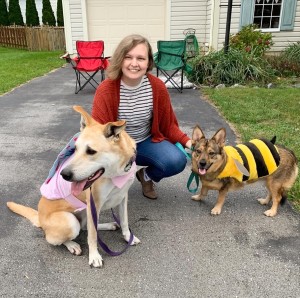
Savannah Admire
Savannah Admire is a writer, poet, and pet mom to three dogs and a cat. She currently lives in Western Maryland. When she’s not writing, you can find her reading, taking photos, or volunteering as a content creator for her local community theatre. Her debut poetry book, Mother Viper, is due out August 12, 2025, and you can follow her on Instagram at @savannahcooperpoetopens in a new tab.
Related articles
![man and lab puppy on park road]() opens in a new tab
opens in a new tabWhen, Exactly, Should You Vaccinate Your Puppy?
If it’s time for a round of shots (no, not that kind), follow this guide.
![Young man cuddling little white shih tzu puppy by the Atlantic Ocean.]() opens in a new tab
opens in a new tab9 Myths About Your Puppy—Busted By a Behaviorist
The internet has a lot to tell you about your new addition. Here’s what’s actually true.
![Border Collie puppy shaking owner's hand]() opens in a new tab
opens in a new tabWhen to Start Training a Puppy: a Complete Puppy Training Schedule By Age
Your puppy training schedule, from eight weeks to six months. Let’s do this.
![Two Golden Retriever puppies playing with a large blue tennis ball outside in the grass]() opens in a new tab
opens in a new tabWhat to Expect at Puppy Socialization Classes
A dog behaviorist schools us on why puppy classes are more about socializing than getting straight As.
![A puppy outside on a leash]() opens in a new tab
opens in a new tabHere’s the Potty Training Game Plan You’ve Been Waiting For
Seven tips you’ll want to pay attention to.
![two small puppies play on a beach]()
Here’s Why You Need to Socialize Your Dog ASAP
Waiting until full vaccination to socialize can cause huge problems for your pup.
